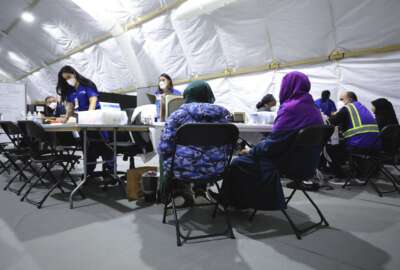
More coordination is needed for housing Afghan refugees on military bases
In today's Federal Newscast, the Defense and State departments have been working together for months to evacuate and house Afghan refugees on U.S. military bases,...
To listen to the Federal Newscast on your phone or mobile device, subscribe in PodcastOne or Apple Podcasts. The best listening experience on desktop can be found using Chrome, Firefox or Safari.
- The Cybersecurity and Infrastructure Security Agency is now the latest agency to outline its office reentry plans. CISA Director Jen Easterly tells employees in a memo that 100% telework and maximum telework will no longer be authorized past March 31. Employees from that point on will need to start reporting to the office for a minimum of two days per pay period. Remote work employees, who have their home residence listed as their official duty station can continue to work remotely. Supervisors will hold talks with employees in the coming weeks to discuss their telework eligibility. Employees deemed eligible for telework must complete new telework agreements by March 25. (Federal News Network)
- The Senate OKs a bill that aims to ensure agencies are buying secure cloud computing services. The Senate unanimously passed the Federal Secure Cloud Improvement and Jobs Act last week as part of a broader cybersecurity package. The bill would authorize the FedRAMP program for five years. It would also require the White House to send Congress annual reports on how agencies are using FedRAMP, as well as a new audit from the Government Accountability Office. The legislation would also set up a Federal Secure Cloud Advisory Committee with representatives form both government and industry. (Federal News Network)
- Starting in October, agencies are on the hook to ensure the products they buy have a domestic content threshold of 60%, a 5% increase over 2022. The Federal Acquisition Regulations Council issued a final rule changing the requirement as part of the Biden administration’s Buy American initiative. Over the next six years, the rule aims to increase the domestic content threshold to 75% by 2029. The administration says the new rule will help close loopholes in the current regulation while allowing businesses to onshore manufacturing and adjust their supply chains to increase the use of American-made components.
- U.S. Transportation Command has formally lifted a stop work order on the military’s new multibillion dollar household goods moving contract. That’s after the Government Accountability Office denied all of the protests that had challenged the award late last week. HomeSafe Alliance, the winner of the contract, says it thinks it can still start performing its first moves under the contract by December of this year, with a complete transition to the new contract by the fall of 2023. That schedule could still be set back if one of the losing bidders files another protest with the Court of Federal Claims and the court issues a stay. (Federal News Network)
- The FDIC is seeking help to manage all of its data. The Federal Deposit Insurance Corporation is planning on creating an enterprisewide data catalog to have a central authoritative source to search, discover, learn and gain analytical insights from. The FDIC released a request for proposals for a vendor to bring together its petabytes of data across various cloud platforms, mainframes and databases into a single software-as-a-service offering. The solicitation asks for a vendor to develop a data catalog that relies on application programming interface or API integrations, and creates and takes advantage of metatdata and indexing strategies. Proposals are due March 22.
- The U.S. government has a new challenge for tech developers: build a tool that can use machine learning to mark documents with controlled unclassified information. Agencies have struggled to find a uniform way of identifying and marking CUI Now the Navy is sponsoring a prize challenge for an automated CUI prototype. A panel of judges will select up to 10 concepts to move onto the demonstration phase of the challenge. The top five scoring submissions will also win a $10,000 award.
- The Defense and State departments have been working together for months to evacuate and house Afghan refugees on U.S. military bases, but still don’t have any written agreements formalizing those arrangements. The Pentagon’s inspector general says the absence of memoranda of agreement has created confusion around roles and responsibilities, and makes budgeting for Operation Allies Welcome a challenge. Pentagon officials claim they’ve drafted the agreements, but State Department officials at least initially refused to sign them.
- The Defense Department is working on a new overarching strategy that will inform its future decisions. The Pentagon says the concept of integrated deterrence will be at the forefront of the new National Defense Strategy. The NDS is the plan that the military bases almost all of its budgetary and operational choices on. The Defense Department says integrated deterrence will include more than a reliance on nuclear weapons to keep China and Russia at bay. DoD plans to have its weapons work together across land, air, sea, space and cyber.
- The top military official in charge of homeland defense says the military needs to prioritize the protection of critical infrastructure in the face of threats by China and Russia. U.S. Northern Command chief. General Glen VanHerck says the United States needs to better define what constitutes critical infrastructure so it can be better insulated from cyber attacks and other subterfuge. VanHerck said current definitions of critical infrastructure are too broad and ambiguous.
- The Senate nears a final vote on a Postal Service reform bill after running into procedural hurdles. A long-awaited reform bill that would save the Postal Service a total of $107 billion is coming close to a final vote on the Senate floor. After a drawn-out week of debate, the Senate has scheduled a cloture vote on the USPS bill this evening. The bill has strong bipartisan backing from 14 Democratic and 14 Republican senators. Two Republican senators, however, are openly opposed to the legislation and have sought to delay the bill over concerns it will hurt the long-term solvency of Medicare. (Federal News Network)
Copyright © 2025 Federal News Network. All rights reserved. This website is not intended for users located within the European Economic Area.
Eric White
Eric White is news anchor and Federal Drive producer at Federal News Network.
Follow @FEDERALNEWSCAST





